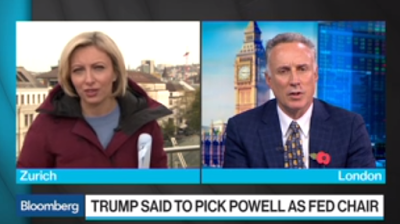- Click to enlarge In London on business and had the opportunity to go to Bloomberg. In this clip, Francine Lacqua discuss the likely nomination of Fed Governor Powell to succeed Yellen at the helm of the Federal Reserve. I make three points. First, that, like others, I recognize a strong element of continuity between Bernanke, who was first appointed by a Republican, Yellen, and now, presumably Powell. Obama appointed Powell, but he chose the Republican because of his experience and it made for easier acceptance by a hostile Senate. Second, I suggest that when not in a crisis the Fed’s function is more technocratic that ideological. This explains why for the last 40 years, the Chair named by the president of
Topics:
Marc Chandler considers the following as important: Cool Video, Featured, FX Trends, newsletter
This could be interesting, too:
Nachrichten Ticker - www.finanzen.ch writes Die Performance der Kryptowährungen in KW 9: Das hat sich bei Bitcoin, Ether & Co. getan
Nachrichten Ticker - www.finanzen.ch writes Wer verbirgt sich hinter der Ethereum-Technologie?
Martin Hartmann writes Eine Analyse nach den Lehren von Milton Friedman
Marc Chandler writes March 2025 Monthly

- Click to enlarge
In London on business and had the opportunity to go to Bloomberg. In this clip, Francine Lacqua discuss the likely nomination of Fed Governor Powell to succeed Yellen at the helm of the Federal Reserve.
I make three points. First, that, like others, I recognize a strong element of continuity between Bernanke, who was first appointed by a Republican, Yellen, and now, presumably Powell. Obama appointed Powell, but he chose the Republican because of his experience and it made for easier acceptance by a hostile Senate.
Second, I suggest that when not in a crisis the Fed’s function is more technocratic that ideological. This explains why for the last 40 years, the Chair named by the president of one party is re-appointed by a president from the other party. In a crisis this changes. Idiosyncrasies, such as preferences, and ideology can play a larger role, though Bernanke once suggested that in a crisis there are no ideologues.
The rules have changed post-crisis, such as the Fed’s ability to “rescue” a single bank is more constrained. If the economy slows and easier monetary policy is deemed necessary, and the zero bound is approached, when does the Fed’s balance sheet come into play? In a crisis, besides QE, are there other measures that have evolved that the Fed could adopt, such a negative interest rates (unlikely) or yield curve management?
My third point deals with Powell’s attitude toward regulation. I play down the differences between Powell and Yellen. They both seem to me to recognize the importance of a robust regulatory framework. They agree that there may be areas in which regulators went further than necessary. The Federal Reserve has significant regulators responsibility. Since Tarullo stepped down, Powell has reportedly picked up some of those duties. Now they have been turned over to Governor Quarles who recently joined the Board and is the Vice Chair, designated under Dodd-Frank to oversee the Fed’s regulatory activity.
Tags: Cool Video,Featured,newsletter
